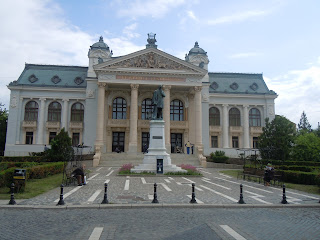From 21st to 25th of May 2012 two teachers and six students of the school went to the last meeting of the project held in Iasi Romania.
When we finally arrived at Iasi, our first thought was: it's too far, but we soon felt happy because we meet wonderful hosts who made us feel at home and showed us how friendly and hospitable Romanian people are.
During the days we were there we did lost of activities and saw interesting places. What we liked most was the Red Lake with its beautiful and breathtaking landscape and then what can we say about the last day and the lunch at "Coroana" Restaurant? There, we all relived the two year project by watching the presentations and videos about the most memorable moments made by each partner school.
This experience has been so useful for the students and teachers of our school, the only regret is that it has finished.
Together for environment
Comenius 2010-2012 Bitonto
venerdì 27 luglio 2012
Visit to The Apulian Water Plant
APULIAN water works
Students visiting the plant
Water covers over 70% of the
earth’s surface and is a very important resource for people and the
environment.Water pollution affects drinking water,rivers,lakes and oceans.This
consequently harms human health and the natural environment.
Water can be polluted by:
. nitrates from fertilize runoff
. lead compounds from lead
pipes
. pesticides sprayed near
water resources
That’s why water must be treated before being used
Plastic Apulian water works
The”Sinni” water treatment plant is considered the most important one in our
region, the treated water is that of the river, Monte Cotugno crossed with a
large reservoir of 450 million cubic meters created by a clay dam . The finished product is drinking
water free of any bacterial forms but rich in minerals: calcium, magnesium,
potassium and sodium. Drinking water is then sent into the distribution network
. The plant is located in the vicinity of the Baker Farm in the countryside of
Laterza (TA).
Tanks of treated water
These tanks are equipped with pipes that are connected
with all the water supply tanks to keep them under constant control. These are
always in continuous operation but even so water is never wasted because it is
fed back into the tanks.
Sedimentation
tanks
The gravity settling is a method of mechanical separation
of the phases that make up an emulsion or a suspension based on the process of
spontaneous sedimentation. This method separates the phases exploiting the
gravity force . It is therefore more
effective when the density of the suspended particles is greater than the
liquid that acts as a solvent. Another parameter that affects decantation is the size of suspended
particles. The smaller they are,the less effective decanting is .
Sludge
dehydration
Dehydration
is a treatment to which sludge,
from the sludge line of sewage treatment
or drinking water plants, is subjected,
in order to reduce the water content and makes the subsequent operations of
treatment and disposal - direct disposal
(eg in agriculture) or incineration more
economic and easier.
The dehydration may be effected
either on a raw mud or on a stable one.
After treatment, the sludge is a material of semisolid consistency.
In the case where the incineration of the sludge is foreseen, a
treatment of dehydration is also intended to increase the calorific value of
the mud itself.
Work in progress for the meeting in Romania
The environmentalist club collects photos about a building that is in need of repair.
This is an old building situated in Modugno street near the school. Look at the status in which it is reduced.
This is an old building situated in Modugno street near the school. Look at the status in which it is reduced.
mercoledì 25 luglio 2012
Meeting in Venice
From 5 to 8 March our partners came to visit our country, the meeting took place in Venice and visiting the Lagoon was one of the most unforgettable experience for everybody.
mercoledì 4 gennaio 2012
Meeting in Portugal
From October 3 to October 7, a boy and a girl and two teachers from our school attended the first meeting of the second year of the Comenius project, “Immediate surroundings”
The meeting was held in Portugal in Almada, a window on the capital Lisbon.
We were warmly welcome by the partner school .
After a working session to plan the activities for the next meeting, we started the tour to discover the customs, culture and civilization of Portugal,
a country behind Spain, but fascinating because it is framed by the Atlantic, the bright and clear sun that ensures a pleasant and temperate climate.
All The visits will be memorable: to Almada's riverside, to the old part of the town, to Sintra, internationally renowned for its beauty, to the palace and gardens of Monserrate and the view of the ocean that left us breathless.
And finally the visit of the great capital, where we came in contact with the great civilization of this people of navigators: the Tower of Belem, and all the old customs of the town.
We also knew traditions as the Lisbon “listening to fado” (traditional songs of passion) that are held in the typical fado houses.
Here are the voices of the partecipating students
Ed eccoci qua, il secondo anno di questo progetto è iniziato. Siamo stati in portogallo, abbiamo conosciuto persone fantastiche, persone che ci hanno mostrato la loro vita, lì abbiamo trovato un clima stupendo in tutti i sensi ed una città meravigliosa.
Abbiamo camminato moltissimo, per centri commerciali, nel centro di Lisbona e siamo stati sempre insieme con i nostri amici veneziani, portoghesi e spagnoli;
Bello è stato anche recarci sulla riva dell’oceano atlantico dove molti di noi hanno colto l’occasione per farsi un bagno.
Tutti insieme abbiamo passato dei bellissimi giorni imparando a convivere con ragazzi aventi un altro modo di vivere, con altre usanze e abitudini.
Un’esperienza assolutamente da rifare!!!
Iscriviti a:
Post (Atom)



















































